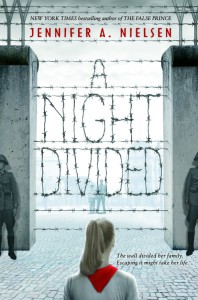 Written in much the same style as Number the Stars by Lois Lowry (1998), The Boy in Striped Pajamas by John Boyne (2006), and My Brother’s Secret by Dan Smith (2015), A Night Divided by Jennifer Nielsen joins the ranks of historical fiction about war and its lasting impact on youth. Although the first three titles tell stories of the youth experience during World War II, Nielsen tells one tale about the effects of the Cold War.
Written in much the same style as Number the Stars by Lois Lowry (1998), The Boy in Striped Pajamas by John Boyne (2006), and My Brother’s Secret by Dan Smith (2015), A Night Divided by Jennifer Nielsen joins the ranks of historical fiction about war and its lasting impact on youth. Although the first three titles tell stories of the youth experience during World War II, Nielsen tells one tale about the effects of the Cold War.
To set the tone, each chapter opens with an inspirational or historical quote or other words of wisdom. These quotes help to tell Nielson’s story of twelve-year-old Gerta who lives in post-World War II East Berlin, a story that makes accessible to middle-schoolers the history of the Cold War.
August 13, 1961 was known in Berlin as Barbed Wire Sunday, the day that a fence divided Gerta’s life in half—both literally and figuratively. Her brother Dominic and her father Aldous now live in West Berlin, while her mother and oldest brother Fritz are left in East Berlin. The Berlin Wall divided a family, a city, and eventually a country.
Constantly under surveillance because Aldous Lowe was a member of the resistance, Gerta feels like a disease and resents the closed-off life she is forced to live, a life of rations and restrictions, of interrogations and tortures, of prohibitions and black market pleasures like Beatles albums and bananas. People avoid her family to prove their loyalty to the East and to stay out of prison. The Stasi—the secret police force—and the Grenzers—the border guards—cause lost friendships, broken families, and betrayals. Virtually killing self-expression, individuality, and thought, they force Germans to serve a soviet country they don’t believe in.
Although this insanity seems ordinary to some East Berliners, to Gerta, it is unbearable. Gerta grows angry and impatient with her mother, who tells Gerta to look for contentment in her current circumstances, yet Gerta also knows that some things even a mother cannot fix. Because she realizes that she is the only person who can change her circumstances, Gerta vows to escape the oppressive communist regime in East Germany so that she can live a life of freedom in the West—a life that she has been told is one of greed and selfishness. Bold and out-spoken with an athletic body, Gerta isn’t sure she is brave enough to risk dying for a life in the West, wanting and wishing are all the bravery she has inside her, until her brother tells her, “That’s not how bravery works. Courage isn’t knowing you can do something; it’s only being willing to try” (37).
Fueled by effort and unwilling to live any longer like animals corralled, together the two form an escape plan. On her path to freedom, Gerta is forced to tell lies, lies with the potential to destroy friendships, destroy families, and end her own life. Yet, her reunited family, her freedom, and her happiness are worth lying–as well as dying–for. Preventing her brother from having to join the military adds another layer of urgency to the escape plan, one that is fraught with perils and threats, fears and challenges.
This gripping story many times reminded me of “The Unknown Citizen,” a poem by W. H. Auden about bureaucracy gone mad. Just as Auden uses a sing-song rhyme scheme and a satirically humorous tone to catalog a “hero’s” life, Gerta sees through the false-benevolence and propaganda spewed by the Stasi. Inspirational, strong, and courageous, Gerta lives her life in the spirit of the words of Johann Wolfgang von Goethe, the German playwright who wrote: “He only earns his freedom and his life who takes them every day by storm” (242).
Nielsen’s book may also encourage young people to see parallels between the Berlin Wall and the border fence between Mexico and the United States or one of thirteen other walls that continue to divide the world. With the parallel posited, perhaps youth will begin to ask questions and to imagine alternatives. With authors and teachers exposing them to multiple perspectives and to situations that encourage a critical stance, we may inspire a courage and a wisdom similar to Gerta’s, a wisdom with potential to lead to an improved way of living in the world.
- Posted by Donna

